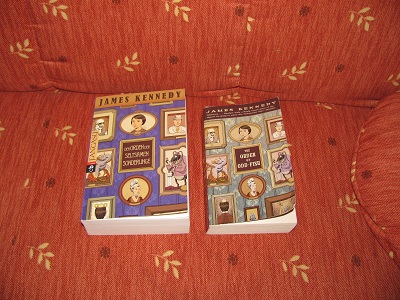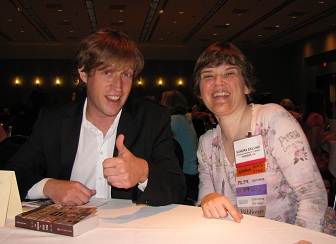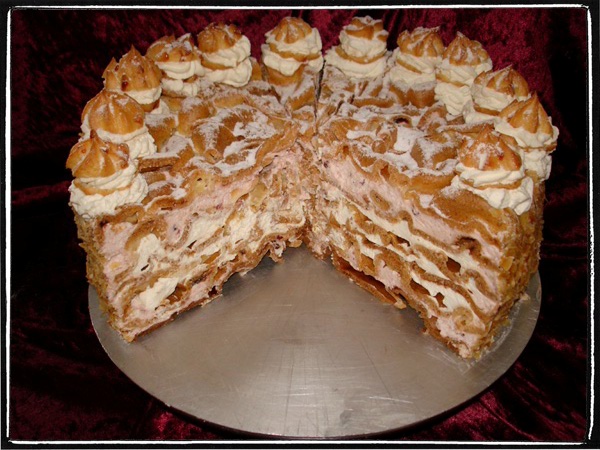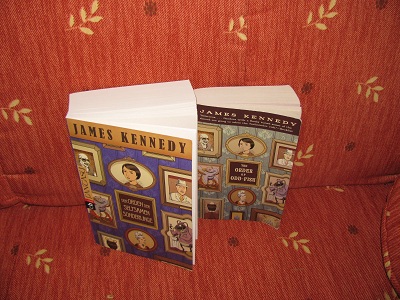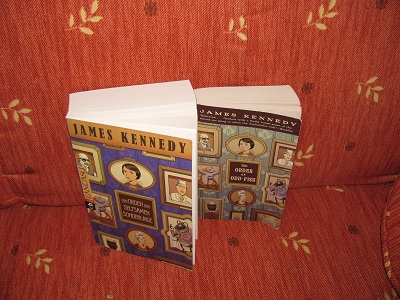Sonderling Sunday – Chapter 9 – Der Orden der Seltsamen Sonderlinge at Last!
 It’s time again for Sonderling Sunday! That time when I play with language by looking at James Kennedy‘s choice turns of phrase in The Order of Odd-Fish and how they are translated into German in Der Orden der Seltsamen Sonderlinge. We look at all the things you’d really like to be able to say in German!
It’s time again for Sonderling Sunday! That time when I play with language by looking at James Kennedy‘s choice turns of phrase in The Order of Odd-Fish and how they are translated into German in Der Orden der Seltsamen Sonderlinge. We look at all the things you’d really like to be able to say in German!
Today I’m part way into Chapter 9, when Jo finally meets The Order of Odd-Fish. I’m on page 82 in English, and Seite 105 auf Deutsch.
We start off with a handy-dandy phrase that’s actually shorter in German, for once!
“dressed in tails” = im Frack
“unkempt” = ungebärdigen
“alarmingly tiny teeth” = beunruhigend winzige Zähne (unrestfully tiny teeth)
Here’s a good one, and candidate for longest word, at 18 letters:
“blare of trumpets” = Fanfarengeschmetter
And I love this one we’ve already seen:
“great shout” = Jubelschrei
“a bejeweled bib” sounds less silly in German: einer juwelenbesetzten Krawatte
Another one that gains a little dignity in translation:
“a trailing cape that looked like a doily gone berserk for seven feet” = ein Häkeldeckchen grö?enwahnsinnig geworden und hätte sich auf zwei Meter ausgedehnt (“a crocheted blanket gone hugely insane and extending behind them for two meters”)
I always like alliteration:
“clinking and jangling” = klingelten und klapperten
More about the trumpets, including an even longer word:
“The trumpets died down” = Die Trompetengeschmetter verstummte
“a multitiered mountain of buttons and bows and collars and jewelry and bustles” = einem vielschichtigen Werk aus Knöpfen, Schleifen, Kragen, Schmuck, Tournüren
“a billowing, flapping, teetering mass of crepe and silk and velvet” = einem wogenden, wehenden, schwankenden Berg aus Krepp, Seide und Samt
“imprisoned in a gigantic, nightmarish wedding cake” = in einen gigantischen, albtraumhaften Hochzeitskuchen eingesperrt
(Come on, doesn’t that just make you want to read the book?)
“firmly” = unerschütterlich
“Jo was starving” = Jo hatte einen Mordshunger (“Jo had a death-hunger.” I like that! Means the same thing, but a fresh take on it, nicht?)
“with a mild pork-plum flavor” = Sie schmeckte ein bisschen nach Schwein und Pflaumen (Well, usually German takes a few more words, I must admit.)
“wrinkles” = einige Falten aus ihrem Gesicht (“some folds on her face”)
“It is a pleasantly futile task.” = Es ist eine höchst erfreulich vergebliche Aufgabe.
“accuracy” = Genauigkeit
“to dither about” = herumzutändeln (I’m so glad I know how to translate that!)
“charter” = Gründungsurkunde (“founding certificate”)
Oh, and here’s a good sentence to say:
“The bit about dithering is the most important.” = Der Teil mit dem Tändeln ist der wichtigste.
“a society of ditherers” = eine Gesellschaft von Tändlern
Oh, and the response is worth quoting the full paragraph:
“You know — fiddling about, puttering, loafing. The Order of Odd-Fish has a long and distinguished history of dithering. Sir Oliver is the world’s foremost authority.”
Auf Deutsch:
»Ihr wisst schon, herumtrödeln, faulenzen, Zeit verbummeln. Der Orden der Seltsamen Sonderlinge hat eine lange und würdevolle Geschichte des Tändelns. Sir Oliver ist tändeltechnisch die führende Autorität weltweit.«
Now, you have to wonder if the word tändeltechnisch has ever been used before. It’s basically saying that on the technicalities of dithering, Sir Oliver is the foremost authority worldwide.
Breaking down the other key phrases, we have, of course:
“fiddling about” = herumtrödeln
“puttering” = faulenzen
“loafing” = Zeit verbummeln (“time idling away”)
Oh, and the title of Sir Oliver’s book provides us yet more:
“Puttering, Muddling, and Mucking About: An Inquiry into Idleness” becomes Tändeln, Bummeln und Herumtrödeln: eine Untersuchung über den Mü?iggang
Now, they’re clearly using some of the same German words for different English ones. Perhaps they don’t have as many different words for dithering as English does? Knowing the German character of industry, I wouldn’t be surprised. But you definitely get the idea!
Speaking of Zeit verbummeln, my timer informs me I’ve already been at this an hour. There is much much delightful frippery left in the chapter, but I must stop for today.
Summing up, I hope this installment has given you insight into tändeltechnisch.
Longest word: Trompetengeschmetter
Shorter in German: im Frack
Most useful: einen Mordshunger
And of course summing up today’s entire discussion: Der Teil mit dem Tändeln ist der wichtigste.
May your herumzutändeln cause you a great Jubelschrei!
Bis zum nächsten Mal!
